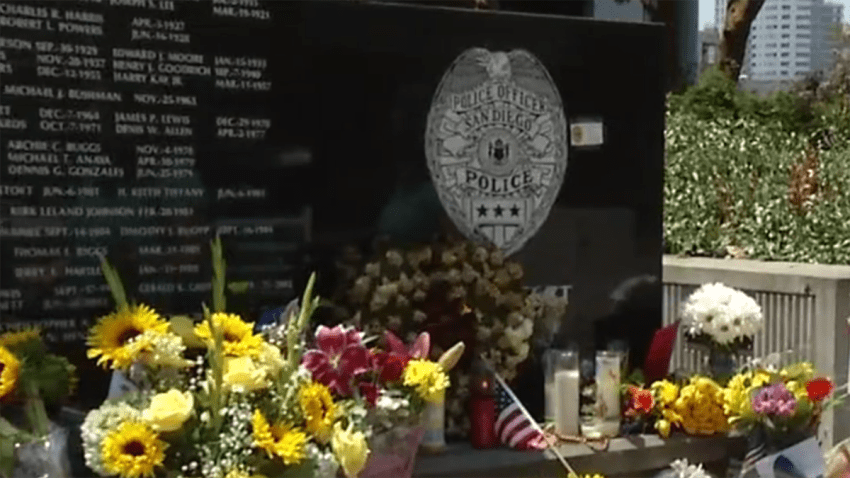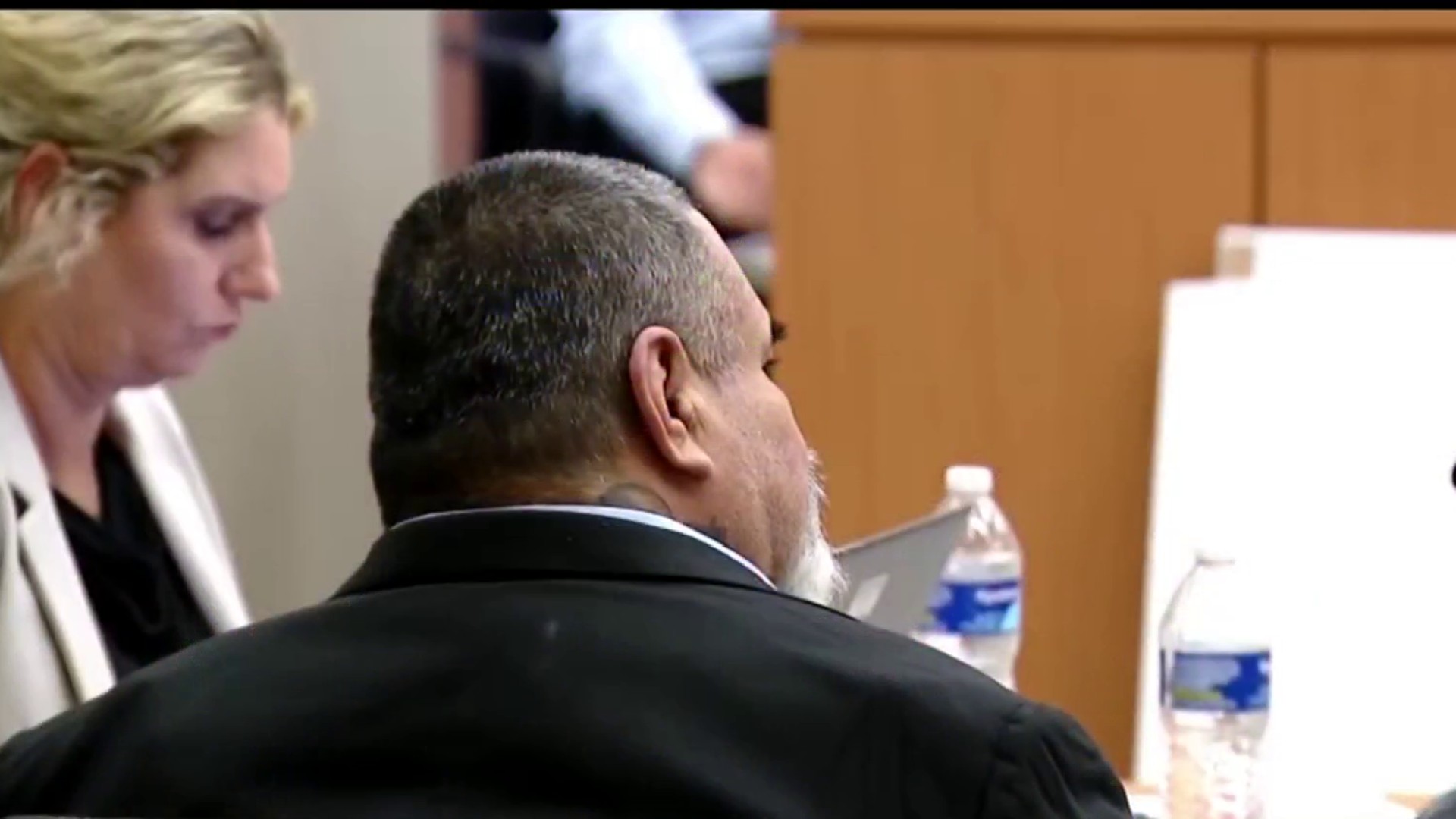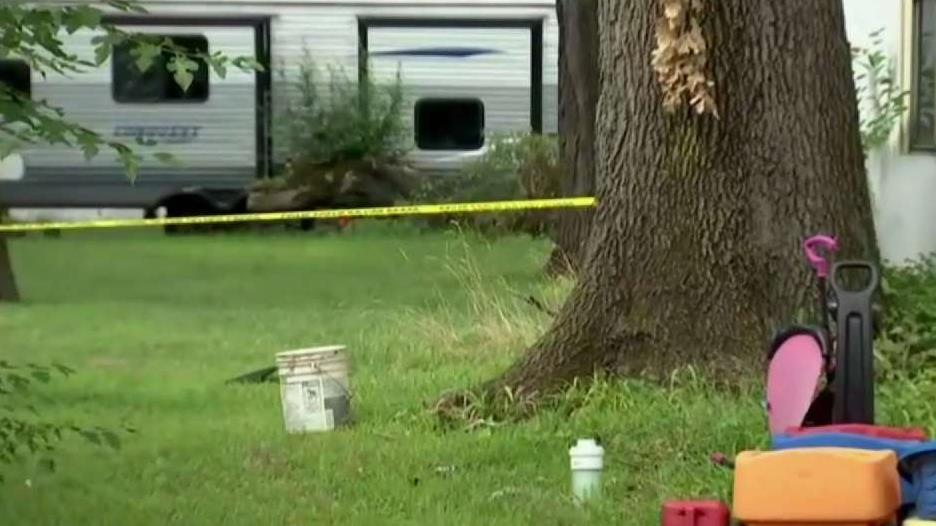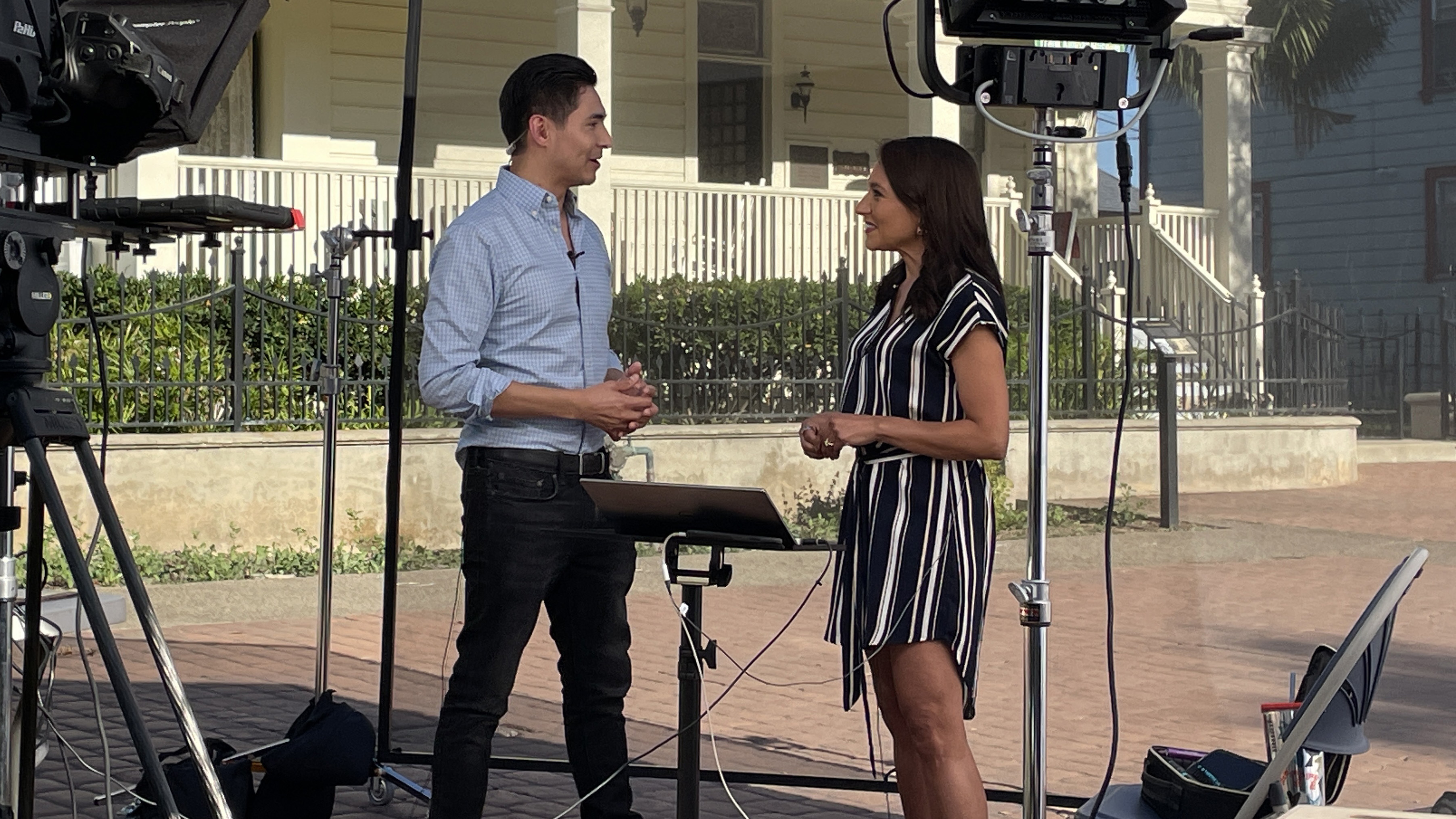The widow of slain San Diego Police Officer Jonathan "J.D" De Guzman burst into uncontrollable tears in court after the man convicted of murdering her husband tried to apologize.
It happened on the second day of testimony in the penalty phase for Jesse Gomez. Gomez was convicted of first-degree murder with a special circumstance of killing a police officer.
The same jury that convicted him will decide whether to sentence him to death, or life in prison without the possibility of parole.
Jane De Guzman had just finished her emotional testimony and was getting up from the stand when Gomez tried to apologize.
Get San Diego local news, weather forecasts, sports and lifestyle stories to your inbox. Sign up for NBC San Diego newsletters.
“I’m truly sorry Ms. De Guzman from the bottom of my heart,” said Gomez.
At that point, an incredulous Jane De Guzman broke into uncontrollable tears and screams. She never responded directly to Gomez but was so shaken that she had to be led out through a back hallway in the court chamber.
Earlier Jane De Guzman told the jury how difficult life has been since the loss of her husband. She said she has struggled to be a single mother.
Local
“Every day I think about my kids. Sometimes I cry on my bed, but I try to hide my feelings from my kids. I think it’s the hardest job I’ve ever had, to be strong for my kids,” said De Guzman.
She told jury her husband was a humble family man who made everyone smile.
She talked over family photographs that were projected onto a screen in courtroom. The photos showed the couple’s wedding in December 1998, a date night to a Los Angeles Lakers basketball game, and a last family trip in March 2016 to Hearse Castle and Yosemite National Park.
“We had a simple life with simple dreams. He’s my best friend, my partner,” said Jane De Guzman.
She also recalled the couple’s last conversation, which happened at 9:48 p.m. on July 28, 2016, just hours before her husband was killed.
“I said ‘OK hun, I love you’ and he replied ‘I love you too, hun,. I’ll be home soon.’ That’s the last word that I heard from him,” said Jane De Guzman through tears.
Jonathan De Guzman’s brother and two children also testified.
“My dad to me was like the most influential figure in my life. He taught me at a very early age to be confident and to embrace who I was,” said Jonathan "Jed" De Guzman.
Amira De Guzman was 10 years old when her father was killed.
“He was always so nice to everyone and I wanted to be like him. It’s really hard, I know It’s hard for everyone,” said Amira De Guzman.
Jonathan De Guzman’s brother gave details of how the family migrated from the Philippines in 1992, saying his brother was likable and always smiling, but also tough and protective.
Two of officer De Guzman’s former partners also testified.
“He was a model of a person, let alone a police officer. He had an ability to be compassionate with people, who most people would say don’t deserve compassion, said Cassie Louret.
“Every time you saw JD, he was smiling. And It was a sincere smile. He was an amazing person and I’m better because of JD,” said William Kellner.
In the afternoon, officer (now detective) Wade Irwin, who was shot and wounded in the shooting testified. He said he fought to stay alive with the thought of his wife and young daughter. And he told the jury of a chilling memory.
“I remember the helpless feeling that I had. That I couldn’t help JD. I knew I was critically injured, I couldn’t give him aid," Irwin said. "My last memory that I have to live with every day of my life is watching the defendant walk up to the car and execute him. I had to sit there and listen to him moan in pain -- and there was nothing I could do,” said Irwin.
Throughout the trial, Gomez has had family inside the courtroom. Today, there appeared to only be one person there on his behalf.
The defense will next call up its witnesses in an effort to convince the jury to spare Gomez’ life.
July 28, 2016: SDPD Officers De Guzman, Irwin Shot in Line of Duty
On the night of July 28, 2016, De Guzman, 43, and his fellow SDPD gang unit partner, Irwin, were patrolling the Shelltown neighborhood of San Diego.
At Gomez’s preliminary hearing in 2019, Irwin testified that as he and De Guzman patrolled, they noticed two men split up and start walking along the north and south sidewalks of Acacia Grove Way.
Irwin said he thought the man on the south side was someone else he had previously arrested. De Guzman stopped the car and Irwin got out of the passenger side, leaving the door open.
Irwin approached the man – Gomez – and asked if he lived in the area. Irwin testified in 2019 that upon speaking to Gomez, the officers were shot “almost immediately.”
Select Video

The officer said Gomez walked up to the open passenger door of the SDPD patrol car and fired, point-blank, at De Guzman as he sat in the driver’s seat. Prosecutors have said the attack on De Guzman happened so quickly, he didn’t even have time to draw his service weapon.
Gomez took off running; Irwin – also wounded – grabbed his service gun and fired on Gomez.
Gomez was found a short time later in a ravine off South 38th Street near the scene. He was hospitalized with a gunshot wound to his upper body but survived.
De Guzman was beloved by his colleagues and family. In 2003, the officer survived a stabbing while on duty, and was awarded a Purple Heart by the department for his valor. Even after that incident, De Guzman returned to the force and his passion to protect the public never wavered.
Irwin returned to duty in June 2017, less than a year after the deadly shooting.
The shootings of the officers jolted San Diego.
Memorials and touching tributes were held across the county in De Guzman’s honor – from the planting of trees in Southcrest to Crossfit workouts held in remembrance.
In 2018, Irwin received the congressional badge of bravery.
Select Video

The Trial of Jesse Gomez: August and September 2021
Opening statements in the trial of Gomez began on Aug. 17, 2021. The proceedings lasted several weeks. Closing arguments were held on Sept. 9, 2021.
On day one of the trial, the jury watched dramatic body camera video of officers desperately trying to save their colleagues. The video showed the first officer arriving on scene minutes after De Guzman and Irwin were shot.
Officer Irwin took the stand on Aug. 24, 2021, and provided emotional testimony about the night he thought he would die.
“I immediately began thinking about my 18-month-old daughter,” Irwin said on the stand in a San Diego courtroom. “Started thinking about my wife, started thinking about my family. I believed at that time, if the defendant saw that I was alive, I would be executed. I was concerned for my partner and his safety; I didn’t want to die.”
Gomez took the stand in his trial on Sept. 2.
He testified that he thought De Guzman and Irwin were gang members – not police officers – when he opened fire on them.
Gomez and his defense team do not deny that he shot the two gang-unit officers. But they argue he should not face the special circumstance allegation because he did not know he was shooting at law enforcement.
Gomez said when he was approached by Irwin that night, he couldn't see anything but a shadowy figure. Then, he heard a voice.
Defense attorney Jessica Petry said in her opening statement that in a dangerous neighborhood like San Diego's Shelltown, when someone asks where someone is from, the question usually ends in a violent encounter.
"The way they approached me. I mean, it happened so fast. It was done within seconds," Gomez said to defense attorney Troy Britt from the witness stand at the San Diego Central Courthouse last week.
Select Video

"Then, all I heard was, ‘Where you from?’ I thought they were gang members," Gomez said. "I was afraid for my life."
Gomez didn't know "until later on" that he had fired on officers, he said.
“I didn’t know what to do. Then I got shot and I turned and ran,” he testified.
Prosecutors asked Gomez to demonstrate in court how he shot at officers.
Officers Gomez and Irwin were gang unit officers. Gomez was a gang member who had plenty of previous interactions with police, he admitted. The neighborhood where the shooting occurred has been known for gang activity.
But prosecutor Valerie Summers argued in her opening statement that Gomez did know they were officers – that he was a felon in possession of a gun and knew he would go to jail if he was caught. So, she said, he started firing on officers immediately.
On the stand, Gomez denied the accusation. He said he was not afraid to go back to prison as a convicted felon in possession of a gun.
Summers also questioned Gomez's statement that he could not see that the two men who approached him that night were in a black and white patrol vehicle.
Gomez also said he had a hard time remembering the events of the day because he had smoked methamphetamine three or four times that day.
"With each pull of that trigger, that defendant makes a decision, 'Should he live or should he die?' Die. Five more times. 'Should he live or should he die?' Die."
Select Video

In her closing statement, Summers painted a vivid picture of the night SDPD Officer Jonathan "J.D." De Guzman and Oficer Wade Irwin were shot. She recalled the emotional testimony given by Officer Irwin and the body-worn camera footage that showed fellow officers responding to the scene to save their comrades.
Her forceful tone contrasted that of defense attorney Troy Britt, who made a quiet yet emotional plea to the jury to understand the circumstances of Gomez' life that led him to believe his life was in danger.
“A car was creeping up on him and that might not mean anything to you or I," Britt said. "But for that gentleman, creeping means something very specific. It means somebody’s out hunting. Somebody’s out trying to hurt you. Somebody’s out trying to kill you.”
Britt does not deny that Gomez killed Officer De Guzman, a 16-year veteran of the force, and shot Officer Wade Irwin in the neck, but he argues that Gomez did not know they were police officers at the time of the shooting -- a claim Gomez made while testifying last week.
Britt then argued that missteps by the San Diego officers -- not flashing their lights and sirens, not turning on body-worn camera and not announcing themselves to Gomez -- played a part in the acts of that day.
The jury deliberated for less than a day and a half to reach a conclusion in the murder trial.




